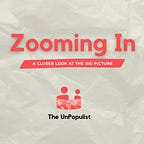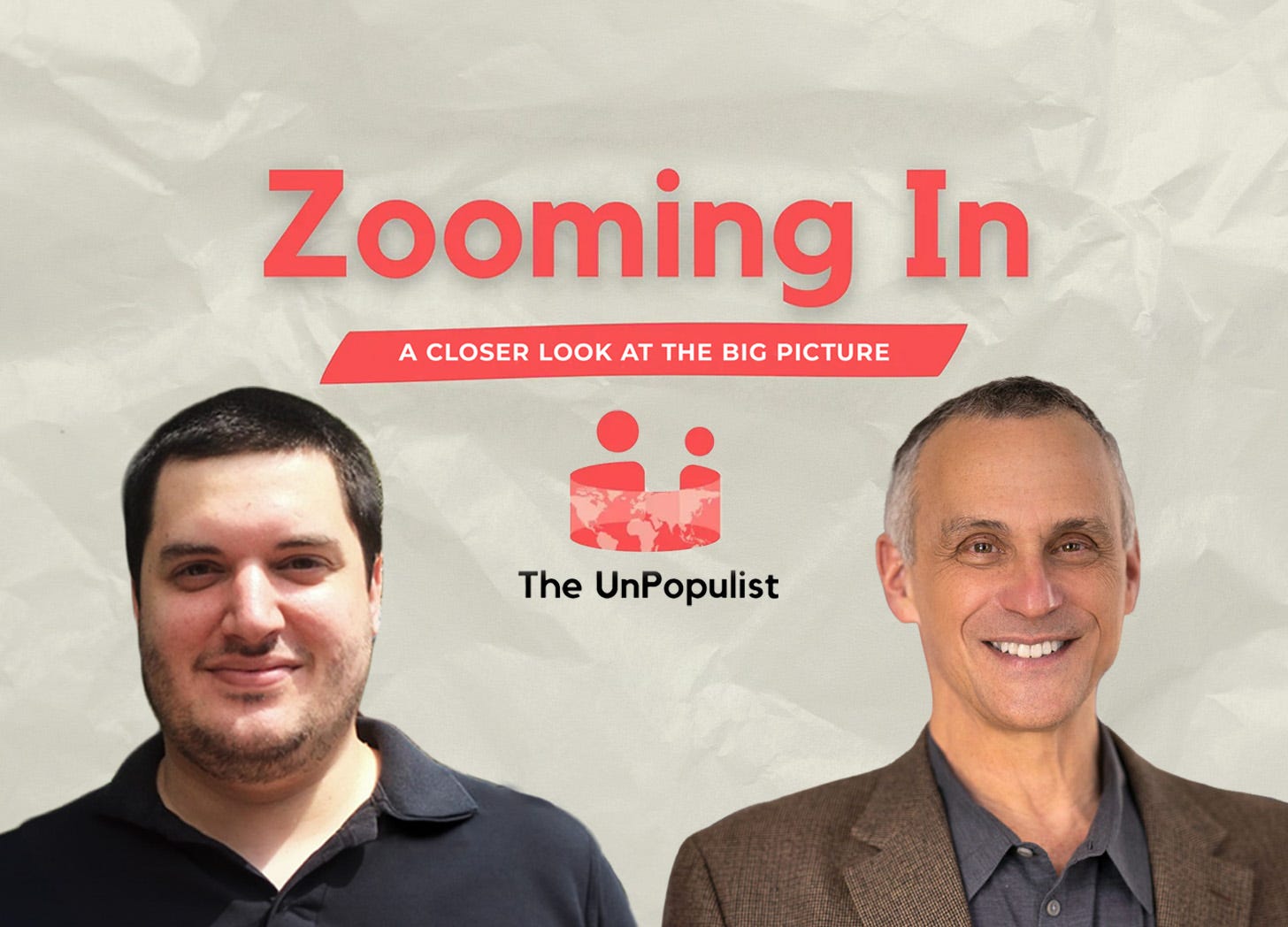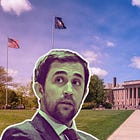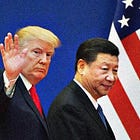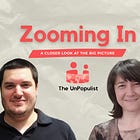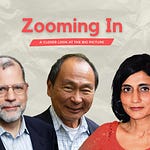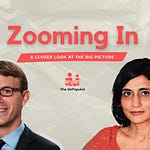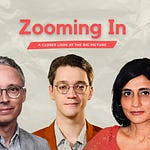Listen to Zooming In at The UnPopulist in your favorite podcast app: Apple Podcasts | Spotify | Google Podcasts | RSS | YouTube
Landry Ayres: Welcome back to Zooming In at The UnPopulist. I’m Landry Ayres.
At a recent conference at the Heterodox Academy, an organization founded in 2016 to promote viewpoint diversity on college campuses and defend academic freedom from the “woke threat,” attendees grappled with the new threat to academic freedom, this time coming from the White House. There was real disagreement about how much attention each threat deserved and we explored these tensions in a podcast episode with writer Cathy Young, who attended the conference.
This week, we take a look at that topic from a different perspective, as Berny Belvedere sits down with another guest at the conference: Michael S. Roth, the president of Wesleyan University and author of many books, including Beyond the University: Why Liberal Education Matters and The Student: A Short History. Roth advocates forcefully pivoting to take on the authoritarian threat that Donald Trump poses.
They discuss how concepts like “safe spaces” and “DEI” have evolved, often serving as convenient scapegoats for political ends, and the Trump administration’s efforts to strong-arm universities through funding threats and legal action. They also discuss whether the failure to appropriately prioritize the relative threats coming from the right and the left would risk undermining liberal democracy itself.
We hope you find the discussion valuable.
A transcript of today’s podcast appears below. It has been edited for flow and clarity.
Berny Belvedere: For many years, you’ve been an active participant in some of the most contentious culture war debates having to do with institutions of higher learning. I want to start by going back to 2021, when you reflected on a book that you had written two years prior, in 2019, on the much-decried notion of a safe space on university campuses. Here is what you said:
When I was writing Safe Enough Spaces, accusations of political correctness were ubiquitous in mainstream media and on social platforms. Very quickly the image of the intolerant PC student gave way to the caricature of the “woke” college student. … The stereotype of the woke social justice warrior, only concerned with canceling other people, is a politically useful, often racialized figure. But it’s a wildly misleading one.
That book, Safe Enough Spaces, dealt with a topic that seemed to engulf so many of us at the time: safe spaces. What can that debate teach us about the more recent ones we’re having over “wokeness” on campus?
Michael S. Roth: I think that the effort to find an antagonist—or, as I said, a scapegoat—is a pretty well-known social phenomenon. We’re seeing it again these days. The attacks so far on higher education have been aimed at so-called elitist schools that are easy to mount anger against, because most people don’t have access to them. The figure of the “social justice warrior” that I was referring to has given way to an even more racialized figure these days, the DEI partisan, who according to the Trump administration is discriminating against white people and is antisemitic and somehow in favor of Palestinians and others in the Middle East who can be distanced from the white mainstream in the United States.
What we’re seeing now is the Trump administration has really doubled down on this effort to find a group of people who can be marginalized and can be attacked, and by attacking them you generate solidarity among those doing the attacking. Before we had the attacks on higher education, the first attacks were really against trans people, and especially trans athletes. Again, trans women playing women’s varsity sports is a very small group of people, but easy to generate fear, opposition, and anger about.
Throughout modern American history you see groups, especially groups supported by the government, finding convenient targets and going after them. That doesn’t mean that the targets of their attack are saints or martyrs. The targets can also be problematic figures. There are good arguments about why it’s unfair for transwomen to compete against cis women in some sports—there are real arguments there. So it’s not as if all these things are open and shut. And there has definitely been antisemitism on university campuses. So there’s often a grain of truth in the attacks. But the government makes an effort to find figures that it can create a radically negative image of, and then marshal our support for their attack on that image.
Belvedere: What I found so useful about that passage of yours that I read is that it lets us start with the forest rather than with any of the individual trees. As I see it, evaluating the more recent fear over wokeness and the particular shape that it takes today on college campuses, but doing so without reference to past iterations of hysteria over radicalism at various institutions of higher learning—and not just at institutions of higher learning but across society more broadly—is, I think, an analytically impoverished way to proceed.
Roth: Yeah, these things have a history. And college campuses are screens upon which the society projects a lot of its anxieties—sometimes its hopes, often its fears.
The transition from anti-woke to anti-DEI is definitely racialized because it’s all about discrimination against white people. That’s the attack on DEI—that it’s reverse discrimination. That seems to have supplanted the term “wokeness,” which, of course, is also a racialized term. But if you attack “fairness”—that’s what equity means—that doesn’t get you very far. If you attack “belonging”—that’s what inclusion means—it doesn’t get you very far. Most people actually want diversity—they’re not anti-diversity. But if you label it “DEI,” it comes to stand for this boogeyman of reverse discrimination.
“We’ve had these conversations on campus at Wesleyan. And now the students are asking for more intellectual and political diversity on the faculty. More faculty are interested, but it has been slow. I mean, we’ve hired a few people who may identify as conservatives. There aren’t that many conservatives who enter the humanities and social sciences these days in graduate school. And I do think that’s a problem. I don’t think the solution is to have the government mandate these things. I think that would be disastrous and very counterproductive. But I do think, within the academy, we should pay a lot more attention to the ways in which our biases make the academy inhospitable for conservative people.” — Michael S. Roth
And, again, the DEI work at some places seems to have been counterproductive, to put it nicely. So it’s not as if this work is all perfect. But the demonization of it has, like these earlier efforts of demonization that I referred to in that passage you quoted, allowed the government to rally the troops for its own purposes.
Belvedere: I also think—and not to anthropomorphize too egregiously here—that that’s exactly what the culture war, as a kind of organism, wants. In order to perpetuate itself, in order to be used as a renewable resource by bad actors, by people looking to exploit their way to certain political and social outcomes, they need for people to only be able to focus on the current form and not connect it to past attempted repressions.
Sometimes it feels like there is a kind of phenomenology of culture war engagement, that there’s a kind of presentist haze that involving ourselves in the culture war inflicts on us—where we don’t quite appreciate that we’ve been rehashing many of these same debates, waging many of the same battles, but under the guise of novel disputes. As you just mentioned, the great skirmish over cancel culture was in many respects a retread of the earlier skirmish over political correctness. The panic over DEI seamlessly followed from a panic over CRT, which is critical race theory. Seemingly overnight, out went the concern over CRT and in came the specter of DEI. Rinse. Repeat.
For the people who are engaged in these debates, until you’ve made the connection that it isn’t this new thing, but that we have seen this before, it doesn’t feel to them, from the inside, that they’re engaged in well-trodden territory. It’s as if, for the most part, our collective memories are wiped, and when the new iteration of the same dispute comes around, we’re back to making the same mistakes we previously made. We grant way too much to bad faith actors, way too much to their bad faith arguments, because we forget that we’ve dealt with them before and that we always found their positions wanting.
Roth: Yeah, I think that’s exactly right. And colleges are a good place for that to happen, right? Because the students are brand new—25% of them, more or less, are brand new every year. I’ve been teaching college students for a very long time. They have very little memory of what had happened for college students five, 10 years before. In Safe Enough Spaces, I try to give an intellectual history of the idea of political correctness, and show how the term evolved from a term that Marxists used about themselves, and then was used ironically on the left, and then was eventually adopted by the right as a critique.
In the ’90s, people who are friends of mine made a film called PCU—politically correct university. If you watch that film these days—and we just showed it on campus recently—it’s an attack on what we would today call “DEI” or “wokeness.” But it’s from the student perspective. It’s somewhere between Animal House and the Trump administration. But you do see the replay of these battles and I think you’re right to ask the question, “Who is being served by the rinse-repeat cycles of the culture wars? What are we not paying attention to if we’re paying attention to culture wars?” That seems to be a good question to ask.
Belvedere: Can you expound on your idea of safe enough spaces? I find that middle word there really interesting.
Roth: Sure. I came out of the study of Freud and psychoanalysis early in my career. Actually, my senior thesis at Wesleyan was called “Freud and Revolution”—so it was always about the politics of psychoanalysis. And I had done a lot of work over the years in that area, in the history of psychology and philosophy. And the psychoanalysts had this notion in the ’50s and early ’60s of the good enough mother, which then became the good enough parent. The good enough parent is someone who didn’t make you psychotic; the idea was that you shouldn’t try to be a perfect parent, because if you try to be a perfect parent, you’re going to screw up your kids big time. But if you just say, “You want to learn the laws of physics? Go run around in the street” ... that’s not a good idea, either. So you want a good enough parent—and they define that as someone who didn’t make you crazy, didn’t make you psychotic.
So I thought that this was amusing to anyone who knew a little bit about psychoanalysis, and also apt way of thinking about how much safety you want on campus. I thought Jonathan Haidt and Greg Lukianoff massively exaggerated the “snowflake, coddled people” in their Coddling of the American Mind. And I thought that the call for safe spaces could simply be a demand that a classroom not be a place where professors hit on their students, where people were not subjected to racist or homophobic abuse, and that you had no right not to be offended, but you had every right not to be harassed or assaulted.
So the safe enough space seemed to be a little bit like the good enough parent. You’re going to be offended by ideas. You’re going to run into things that you find very troubling. But you’re not going to be told, “If you don’t sleep with me, you don’t get an A.” You’re not going to be told that you don’t belong because you’re a Jew, or because you’re a religious Christian, or because you’re Black.
I found that when I went back and looked at the history of the words “safe spaces”—again, I’m an intellectual historian—it comes out of industrial psychology in that they try to find places for workers where they could talk about what was right and wrong with their situation of employment. Again, you weren’t asking them to only work two hours a day or anything, but you were trying to find a way to get them to feel comfortable enough to tell an interviewer about their workplace.
The subtitle of the book is: “A Pragmatist’s Approach.” I was trying to find a middle ground between those people who really wanted to make sure that students were protected and those people who thought, “Oh, my God, we’re protecting students too much. They don’t like my jokes, they don’t like my comedians or my music.”
I mean, I thought at the time—you know, this is probably a decade ago—that some of my colleagues who are complaining about their students, they really should just get out of this line of work. If you’re a teacher, you shouldn’t complain about your students—you should figure out how to teach them. And if you can’t, you don’t get to write a book about why they’re not good people. You actually should just stop teaching. Let somebody else try to teach them, because your job as a teacher is to create an environment in which they can learn.
I was tired of hearing from people, “Well, students don’t want to learn,” or “students don’t want to hear offensive comments.” I’ve been teaching since the early ’80s, and of course the students are different today than they were then, but you have to find a way to teach them. And, I thought, creating an environment where they were protected from harassment and intimidation, but not protected from novel ideas, was a safe enough space, a space of learning.
In my next book, The Student, I talk about a place where students can practice freedom. It’s a similar idea. I think campuses are places where people practice being free. And they make some mistakes, and they learn from those mistakes. So you want it to be safe enough for them to make mistakes and not die. But you don’t want it to be so safe that they never actually practice, in profound ways, new ideas and new modes of living.
Belvedere: That’s well put. I think there are concepts that are innocuous in the hands of some and then a pretext for something darker and more repressive in the hands of others. To me, the term “intellectual diversity,” and some of its corollaries today, like “ideological diversity,” have taken on that kind of valence. So, there’s a reading of intellectual diversity that conveys and registers the simple benefit of being able to count on and include multiple different perspectives. That’s obviously good as a way to preclude groupthink, which is something that people are always worried about.
But that idea, ideological or intellectual diversity, has also been used as a kind of prelude to a political push to repress those of a particular viewpoint. You’ve written about its importance as well. In your view, what’s its value? Why is it important?
Roth: I always tell students at the beginning of the year ... and even before they actually choose to go to Wesleyan, I meet with prospective students, and I say, “You shouldn’t choose a school where you’re going to fit in, if fitting in means finding people like yourself. You should choose a school where you’re going to meet other people who don’t have your view, where you’re going to be challenged, and where you won’t be like everybody else. You don’t learn very much from people who are like yourself. You learn from people who have different views.”
And, again, this is a pragmatist view. It’s not a hard-and-fast formula. You’re not going to learn something from a QAnon conspiracy theorist about the fate of pedophiles, and you’re not going to learn from Nazis about Judaism. So it’s not an open invitation to everything. But you also don’t want to have a situation where you are just among like-minded people, because it’s just harder to make intellectual progress if everybody’s saying the same thing.
“People are very afraid of the federal government, and for good reason. The federal government has enormous powers, even when it obeys the law—and the Trump administration shows it doesn’t really care about obeying the law. So there’s a lot of fear. I would have thought that because the Heterodox Academy has been standing up against the tide on campuses that they would stand up against this assault. … I think intellectual diversity will get a bad name if it’s shackled to an authoritarian, anti-science, lawless leader.” — Michael S. Roth
So about a decade ago, I wrote a piece in The Wall Street Journal about the need for more intellectual diversity on campuses. And I came late to the realization that campuses, especially in the humanities and social sciences, and especially in the Northeast, were just stocked with people who had very similar political views, and that when I talked about that with my colleagues and said to them, “You know, you tend to hire people whose political views are quite like your own,” they gave the kind of answer that very prejudiced people gave in the ’60s and ’70s when they were asked to hire minority people, or if they asked to hire women. I remember clearly, when I was in graduate school at Princeton, people saying, “Well, you should hire some women in the history department,” and they said, “Oh, well, we would, but we only hire the best.” And they didn’t hear prejudice in their view. They thought they were hiring the best, but they actually did not believe that women could be the best. They had blinders on. So I thought that by talking to my colleagues about this, they would take a beat and say, “Oh, well, maybe I think Jerry is so great because he makes me feel better about my own point of view” rather than “Jerry is so great because Jerry is a great sociologist or a historian.”
So, in that piece, I called for an affirmative action program for conservatives, which outraged everybody. Because conservatives said, “We don’t need affirmative action. We just need a meritocracy.” And my friends on the left said that I had sullied the words “affirmative action” with the word “conservative.” But I really just wanted to start a conversation, especially in the faculty about their implicit and sometimes explicit biases against conservatives.
Now, I realize that a liberal or a progressive can teach conservative things. I’m a Jew from Long Island. I teach Aquinas every year. I do my best. You don’t have to be a Catholic to teach Aquinas, and you don’t have to be a Nietzschean to teach Nietzsche. I realize that, of course. But it does help students to explore a variety of questions when their teachers are open to exploring a variety of questions and, without conservatives on the faculty, some questions don’t get explored in the same way as they would if we had those people on the faculty.
I also realized—again, only about a decade ago—that this prejudice also extends into the admissions process at highly selective schools. I was giving a book talk and a group of guidance counselors were there, and they said that they would never allow a student applying to a place like Wesleyan or an Ivy League school to say, “My kind of civic engagement is defending the rights of the unborn.” And I said to this guidance counselor, “Oh, I’m sure that’s not true. Admissions people would recognize that that’s a form of civic engagement, whatever their own views are about abortion or reproductive rights.” And they all actually laughed at me. They said: “It would be professional malpractice for a guidance counselor to let a student talk about that in an application to one of these schools.”
I found that horrible, actually. Not because I have particular sympathy for one argument or the other. I just thought it was so obviously a form of civic engagement, that if we say we want civic engagement, we have to include civic engagement on the right. Not murderous civic engagement, but civic engagement of the kind you find in American politics.
So we’ve had these conversations on campus at Wesleyan. And now the students are asking for more intellectual and political diversity on the faculty. More faculty are interested, but it has been slow. I mean, we’ve hired a few people who may identify as conservatives. There aren’t that many conservatives who enter the humanities and social sciences these days in graduate school. And I do think that’s a problem. I don’t think the solution is to have the government mandate these things. I think that would be disastrous and very counterproductive. But I do think, within the academy, we should pay a lot more attention to the ways in which our biases make the academy inhospitable for conservative people.
Belvedere: You spoke about walking the tightrope between fostering a culture of free and open inquiry and avoiding a kind of free for all where anything goes. So what’s the limiting principle of a responsible approach to cultivating that culture of free and open inquiry? I’ll use the example that my last conversation partner on this podcast used: We want to be able to rule out having a debate over whether slavery was morally right—I mean, that’s settled—but we want to be able to have a productive discussion over whether any act of political terrorism is ever justified. That seems like a debate that should still be live, where we can reflect on arguments for and against. Is there a conceptual frame that you find useful here for how to rule in the right stuff and rule out the wrong stuff?
Roth: I don’t think there is such a frame. That’s why I’m a pragmatist. I believe that these things are settled in situations by people who participate in the conversation. I don’t think there is an epistemological principle, or even an ethical principle, that will work across the board. So much of it will be definitional. Do you call the dropping of the second atomic bomb “terrorism”? Do you call firebombing Dresden “terrorism”? Do you call the bombing of England by the Germans “terrorism”? As a historian, you want to study these things.
In the sciences, it’s sometimes easier because the consensuses are harder. But what’s important is when people find an avenue of conversation to be productive. And this happens in class all the time. Someone will raise a question, and you want to tease out how that question could be considered most productively by most students. And there are times when someone will say something that is not going to be a productive avenue for conversation. I don’t think there’s a formula for it. I think there is a culture that cultivates conversations that can advance our inquiries so we have better conversations down the road.
My own view is you don’t get something called truth with a capital T and then you’re done. You get better conversations, and the people in the conversations are the judges of whether they’re better or not. There’s no outside principle that will do that for you. I was a student of Dick Rorty’s, and that work continues to be very influential to me. That American pragmatist tradition from [William] James and [John] Dewey and [Richard] Rorty continues to resonate for me as a way of thinking about this without principles but with an attention to history and the possibility of productive inquiry.
Belvedere: You recently participated in this year’s Heterodox Academy conference, where you implored universities and their presidents to focus on the Trumpian threat and beating that back, rather than perceived woke excesses. What response did you receive? And what did you think about it?
Roth: Oh, I received more of a response than I expected. I’ve been part of the Heterodox group since they started. But Jonathan Haidt says that I’m the heterodox member of this group, because I always yell at them. I always find them very annoying. But I go, and they invite me to do these plenaries, and I think my role is to be a gadfly of sorts. They pride themselves on being gadflies. But when they get together ... I said in my previous plenary that I had never seen so many white men with grievances in one room. I mean, it was really quite extraordinary. Talk about victimhood. I mean, these guys were really whining.
This year, I said that I thought that they had done the work for the Trump administration, that their critique of wokeness had resulted in an authoritarian assault on higher education, and that if they continue to worry about whether the Near Eastern studies department has too many leftists rather than worry about the demise of academic freedom at the hands of the government, then they are participating in what would become a fascist orthodoxy. I don’t think I used the word “fascist.” I should have. I used the word “authoritarian.” And I said that the so-called neutrality principle that people have adopted out of cowardice and complicity over the last three years is a sham.
They set up the plenary so that the president of Dartmouth and I would have a little angry exchange—which we did. And I was a little surprised that it got as much attention as it did. I got comments from various people. It was in The New Yorker and other places. One of the reactions, from somebody you interviewed for this podcast, said that people need to be able to walk and chew gum at the same time. That would be fine if they were actually critiquing illiberalism on campus, and also standing up against the Trump administration. But that’s not what they’re doing. College presidents are, on the whole, with a couple of notable exceptions, being silent in the face of an extraordinary authoritarian attack on higher education and academic freedom.
So I made those comments. I got some applause. I got some negative reactions. I felt like it did my job.
Belvedere: For academics and administrators to continue to focus on the specter of wokeness, or instances of alleged progressive overreach, only makes sense if they believe that that, and not Trump’s attacks, represents the greatest danger to academia. Why else would they de-emphasize Trump’s assault and instead focus on wokeness unless they thought that the latter was really and truly the bigger threat?
Roth: Oh, I’m very sympathetic to what you’ve just said. But I think the reason is because there’s no financial penalty for criticizing wokeness.
Most American students are not studying Near Eastern studies or English. They’re studying STEM fields and economics and psychology, where most of the time this matters not at all. But if they objected to the federal government’s use of its powers to control hiring admissions, the curriculum, what have you—as the state government in Florida has done—there might be significant penalties to them and to their governing boards.
People are very afraid of the federal government, and for good reason. The federal government has enormous powers, even when it obeys the law—and the Trump administration shows it doesn’t really care about obeying the law. So there’s a lot of fear.
I would have thought that because the Heterodox Academy has been standing up against the tide on campuses that they would stand up against this assault. But instead they said, “Oh, we told you so.” The idea is that, “You’re getting what you deserve.” I find that really sad, actually, because I think intellectual diversity will get a bad name if it’s shackled to an authoritarian, anti-science, lawless leader.
Belvedere: News just broke that Columbia University settled with the Trump administration, agreeing to pay it $200 million in order to be able to receive federal grant and research money once again. And, really, “settled” is the wrong word, since this was for all intents and purposes a glorified bribe. This was the victim paying the bully so that it can get on with its life. You were interviewed about this by PBS and I loved the way you put it: you said that it was akin to a paying a ransom in a kidnapping situation.
“In Vichy, France, where you have a cafe, and they tell you, “You can’t serve Jews,” and you say, “Okay, I won’t serve Jews. This way, the dishwasher still has a job” … that kind of compromise with authority in order to protect other people seemed to me the kind of appeasement that is doomed to fail in the long run.” — Michael S. Roth
For anyone who may not know the particulars and may be inclined to give the government the benefit of the doubt in its dealings with colleges and universities, why are they mistaken about that? Why is this more of a kidnapping and ransom situation than a legitimate push for reform from the federal government?
Roth: This was more like a ransom situation because it wasn’t as if Columbia University had been found guilty of doing specific wrong things that harmed specific people and that those people had claims for monetary damages to compensate them for the harm that they had suffered. Instead, Colombia was put in a situation where in order to do the work that it is supposed to do, in order to work on its mission of research and teaching, it had to give the federal government money. And the government said, “We don’t like the way you’ve been conducting your discipline. We don’t like the way you’ve been handling protests or how you’re teaching Middle East studies and other forms of regional studies. And so in order for you to do your work in cancer or diabetes research or other areas that involve federal funding, you have to give us a lot of money. And you have to set up a structure that allows us to monitor how you’re doing on the matters that we say concern us—such as, say, reverse discriminate in admissions or in hiring.”
And some of that I understand from the university’s perspective is: “We’re going to actually obey the law. So you can monitor us, because we are going to obey the law. We’re not going to use affirmative action, which is no longer legal in the United States.” So, in that sense, the government is not asking the university to do something in addition to what it would normally do, except to undergo closer scrutiny by the government about how it teaches, does research, hires faculty, admits students. That alone is extraordinarily intrusive.
The government has also asked Columbia to change its business model so it has fewer international students. That’s a remarkable thing to ask a private organization to do. And so, under the guise of civil rights violations involving antisemitism, it’s asked for all these other things, which I think the university would normally dispute or reject. But the government says, “If you don’t give us money and agree to those things, we will not allow you to have access to the resources that you’ve come to depend on for the extraordinary scientific work that takes place at the university and then the hospitals that are affiliated with the university.”
So Columbia was in a kind of hostage situation. The government was holding the sciences hostage. And if Columbia wants to engage in that high-level scientific research, and it does, and we want them to do it because they’re very good at it—that’s why they get those grants, because they win them in competitive application processes—the government says, “You have to give us $220,000,000 and agree to this oversight.”
So regardless of whether Colombia feels it has done anything wrong, they just want to give them the money so that they can go back to work. That’s why I describe it as a ransom situation, or, even more graphically, people have described it as extortion.
Belvedere: I want to read another quote of yours that I found really insightful. You said: “The story of American higher education has been hijacked by people who have benefited from it. They’ve succeeded in life in part because of the education they’ve had. But they get out, and then they kind of pull up the ladder.” Can you say more about who these people are and what you meant here?
Roth: Well, President Trump went to an Ivy League school. Vice President Vance went to Yale Law School. The Secretary of Defense went to Princeton. All these guys went to these schools. And what they’re now doing is making it harder for these schools to provide the kind of assistance that they—well, Vice President Vance—received that made it possible for them to go to these places. So by “pulling up the ladder” I meant that they will make it harder for colleges and universities to be engines of social mobility. I don’t think we’ve done a good enough job in that respect over the last 10 years, but it’s still a significant vehicle for many Americans to expand their worlds intellectually and culturally, but also improve their economic prospects. And by attacking these schools and their ability to serve low-income students or students of color they’re destroying a vehicle for advancement that they themselves have used to become political leaders or media celebrities, or both.
Belvedere: I want to ask you a question in your capacity as a university president. At Wesleyan, you approached student encampments, in protest over the war in Gaza, differently than other high profile university presidents had. What was your approach, and what was the thinking behind it?
Roth: Well, the demonstrations at Wesleyan were nonviolent and on the whole not disruptive. What I mean is that there was an encampment, but the protesters recognized the rules of engagement, so to speak, at Wesleyan. They couldn’t block any entrances. They couldn’t claim territory for themselves that was off limits to other people. They could bear witness to a cause, but they couldn’t do so in a way that made it harder for everybody else to go about their business. And although they were passionate about their pro-Palestinian views, and they wanted the university to divest from any companies that did business with Israel—and so disagreed with me about that—they made their views known in a way that did not prevent other people from either speaking or attending class or going about the business of the university.
So I applauded them for being concerned about a really important event in the world, and the extraordinary human rights abuses that we’ve seen in Gaza. At the same time, I thought their demands, as they put them, were not appropriate.
So we allowed them to have their encampment, and then we negotiated an end to their encampment, which allowed them to make an argument to the board—since they knew I disagreed with them—about why universities should divest. And I think everybody learned something. They learned something about protest and about making their voices heard. We heard their arguments about divestment. They were rejected by the board of trustees. There was a small group of protesters who violated the rules and they had consequences. In the fall, when there was that divestment vote, there was a very small group of protesters who attempted to take over a room. I had the police come, and then the protesters left. The guidelines made it clear. The encampment probably had the same percentage of Jewish students in it as there were who were not in it. There were people who definitely were offended by the slogans of the pro-Palestinian group, but, as I’ve said before, and I said it in the meetings with Jewish students last spring, you don’t have a right not to be offended. Speech is protected. Harassment is not protected. There wasn’t harassment on our campuses.
So I think part of it is that there’s a tradition of protest at Wesleyan. I myself slept in the president’s office when I was a student to protest against apartheid in South Africa. There are rules of engagement that students and the university usually understand. And I think our size helped a lot. We’re 3,200 students. The students know me. I walked through the encampment every day, a couple times a day. At the bigger places, it was just harder for the administrators to have productive conversations with the protesters.
In some schools there were lots of people who were part of the protest who weren’t affiliated with the school. We didn’t have that at Wesleyan. When you have outsiders who have no stake in the institution, that does make it harder. They don’t really care if the institution does well. I think the people at Wesleyan wanted Wesleyan to do the right thing, because they also care about Wesleyan. And we had different views, but we believed in our institution. And I think that helped a lot.
So, yeah, I defended their right to protest. I was hoping that their politicization would lead to much higher participation in the elections in the fall. I’m not sure it did, actually. But my hope was that students would become more energized citizens—not just protesters, but energized citizens who would work in their towns and in their states and in the country for a better public sphere.
That, to me, would be the best outcome of people learning to raise their voices and to make political arguments.
Belvedere: Looking out at some of your counterparts at other colleges, did you feel like, among other college presidents, that there was a sufficient level of alarm over the arrest and detention of Mahmoud Khalil?
Roth: I wrote something in Slate when he was arrested. I found it an egregious assault on the values of higher education in the United States. Mr. Khalil and I would not see the world the same way. We have different views about the Middle East. But that doesn’t matter. Him, the young woman at Tufts, these were egregious violations of basic rights in this country, and intimidating for college campuses in particular.
I don’t think my view is that different from other college presidents with whom I’ve had informal conversations. But they were very reluctant to say that in public. A friend thought I was wrong to speak up, and the reason he gave me for that is: Michael Roth won’t get hurt, but maybe other people who work at Wesleyan will get hurt. There’ll be a raid on the kitchen staff or the groundskeepers. There’ll be attack on academic departments or on grants.
“The government has asked Columbia to change its business model so it has fewer international students. That’s a remarkable thing to ask a private organization to do. … Under the guise of civil rights violations involving antisemitism, it’s asked for all these things, which I think the university would normally dispute or reject. But the government says, ‘If you don’t give us money and agree to those things, we will not allow you to have access to the resources that you’ve come to depend on for the extraordinary scientific work that takes place at the university and then the hospitals that are affiliated with the university.’ So Columbia was in a kind of hostage situation.” — Michael S. Roth
I do think that’s the basic collaborationist dilemma. You say, “I know it’s wrong for them to arrest these international students, but I don’t want to say anything, because I don’t want to make things worse for others.” John Ganz called this the Vichy moment in America. In Vichy, France, where you have a cafe, and they tell you, “You can’t serve Jews,” and you say, “Okay, I won’t serve Jews. This way, the dishwasher still has a job” … that kind of compromise with authority in order to protect other people seemed to me that that’s a kind of appeasement that is doomed to fail in the long run.
There were some people who spoke up for sure: Michael Gavin at Delta College, Pat McGuire at Trinity Washington, and some others. And then eventually there was a statement from the AAC&U and the American Academy. That was actually more about funding for scientific research, and I thought it was really important that they also object to the arrest of international students, especially if the arrest is really because they protested. I mean, the people protesting me, I would object to them being arrested. I don’t think they’re right in their views, but that doesn’t mean you should arrest them. That’s pretty obvious. That’s what America has long stood for.
Belvedere: You recently won the very prestigious PEN/Benenson Courage award. Can you tell us about that?
Roth: Yeah, PEN, an organization of writers who defend free speech, gave me their courage award, much to my surprise. A poet friend of mine said, “If they offered me a courage award, I’d duck!” I don’t see myself as courageous at all. I’m actually quite nervous about everything. But I guess, because I’ve been outspoken about these issues, the PEN group gave me that award—for which I was very grateful. My friend, Saidiya Hartman, who I admire greatly as a cultural historian and critic and artist, introduced me, and I hope it brought some attention to efforts in the academy to resist authoritarianism.
© The UnPopulist, 2025
Follow us on Bluesky, Threads, YouTube, TikTok, Facebook, Instagram, and X.
We welcome your reactions and replies. Please adhere to our comments policy.


